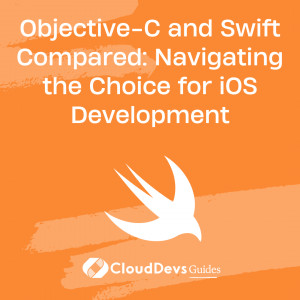Objective-C and Swift Compared: Navigating the Choice for iOS Development
Developing apps for iOS has been an evolving landscape, particularly with the introduction and rise of Swift. Traditionally, Objective-C was the go-to language for iOS development. However, since Apple launched Swift in 2014, it has increasingly become the preferred choice, and the demand to hire Swift iOS developers has soared. But which of these two languages – Swift or Objective-C – is the right one for you to develop your iOS application? In this post, we’ll compare Swift and Objective-C, providing a clear perspective that will help you make an informed decision on whether to hire Swift iOS developers or stick with Objective-C.

Understanding Objective-C
Objective-C has been around since the 1980s and was the main programming language used by Apple for macOS and iOS operating systems, and their APIs, Cocoa and Cocoa Touch, before Swift.
Pros of Objective-C:
– Matured Language: As Objective-C has been in use for a long time, it has a large number of libraries and frameworks that can be quite helpful. It also has a significant community, which means a great deal of support is available.
– C and C++ Compatibility: Objective-C is a superset of C, and it can directly call C code. It’s also compatible with C++, which is useful in some scenarios where those languages are required.
Cons of Objective-C:
– Complex Syntax: Compared to Swift, Objective-C has a more complex and difficult-to-understand syntax, which can result in longer development times and harder-to-read code.
– Lack of Safety Features: Objective-C lacks some of the safety features found in Swift, such as optionals and type safety, which can make it less secure and more prone to crashes.
Understanding Swift
Swift is a modern language developed by Apple to overcome some of the shortcomings of Objective-C. It is designed to be easy to learn and use, and it includes a number of safety features to prevent errors and improve code readability.
Pros of Swift:
– Simplified Syntax: Swift has a clean, expressive, and easy-to-learn syntax, which makes it easier to read and write code. Its syntax is also more concise, which can reduce coding efforts.
– Safety Features: Swift includes several safety features, such as type safety and optionals, to help reduce common programming errors.
– Performance: Swift often outperforms Objective-C in various tasks. It’s designed to optimize the latest hardware and software trends.
Cons of Swift:
– Less Mature: As Swift is a newer language, it does not have as many libraries and frameworks as Objective-C, and its community is smaller.
– Source Compatibility Issues: Earlier versions of Swift suffered from source compatibility issues, but Apple is actively working to improve this.
Swift vs. Objective-C: A Comparative Analysis
Let’s dive into some specific differences, advantages, and disadvantages of both languages, along with examples:
- Syntax:
In Objective-C, the syntax can be quite verbose. For example, consider this piece of code that defines a simple function:
```objective-c
-(void)greetUser:(NSString*)userName {
NSLog(@"Hello, %@", userName);
}
On the other hand, the same function in Swift would look like this:
```swift
func greetUser(userName: String) {
print("Hello, \(userName)")
}
As we can see, Swift’s syntax is cleaner and more concise.
- Memory Management:
Objective-C uses Automatic Reference Counting (ARC), just like Swift. However, in Objective-C, you have to worry about memory management when dealing with Core Graphics APIs or bridging to C. Swift, in contrast, handles all memory management automatically.
- Safety:
In terms of safety, Swift has the edge. For instance, Swift uses optionals to handle the absence of a value. Optionals either contain a value or nil to indicate the absence of a value. An optional in Swift looks like this:
```swift var myString: String?
Objective-C doesn’t have this concept; a similar situation in Objective-C would be to use a nil pointer, but using a nil pointer without checking can lead to crashes.
- Interoperability:
While Objective-C can freely use C and C++ code, Swift offers seamless interoperability with Objective-C. You can use both Swift and Objective-C files in a single project, and Swift can also use Objective-C’s frameworks.
- Speed:
Swift has been improving performance-wise since its release. As of now, it usually outperforms Objective-C, especially in areas such as complex object sorting and string manipulation.
Conclusion
In summary, the choice between Swift and Objective-C will largely depend on your project’s needs and your comfort level with the languages. For new projects, Swift’s simplified syntax, safety features, and performance make it an attractive option, leading many to hire Swift iOS developers. However, Objective-C’s maturity, large number of libraries and frameworks, and vast community support still make it relevant, especially for maintaining existing projects.
Remember, the goal is not to identify the “best” language overall but to determine which language best suits your specific needs. Whether you choose to hire Swift iOS developers or continue with Objective-C, both are capable languages for iOS development. The right language, and subsequently, the right development team, is the one that best suits your project, team skills, and long-term maintenance and development plans.
Table of Contents






